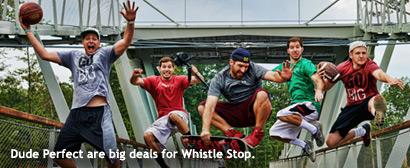
Whistle Sports held its NewFronts presentation at the Hard Rock Cafe on Times Square last spring. The night before, it attracted a huge crowd in front of the place when it held an outdoor
exhibition of some of its star talent doing the kind of trick shots and awesome sports-related feats that gets millions of young people, mostly boys and men, to go to Whistle Sports’
multiplatform sites.
This is a sports video platform that is the least likely place you’d visit to find a score, or hear an argument about the value of some would-be free
agent. It is, instead, the place to be to see something like this basketball vaudeville on Vine, Or this little demonstration of ridiculous ping-pong shots on YouTube.
Even its collaborations with major sports leagues are not
what you’d expect. Its “Bad British Commentary” of an MLB game hilariously assumes the manager coming out of the dugout to
visit the pitcher is actually a “pushy parent, out of control” who has come onto the field “to tell his son off, in public” just like he did back when he was a little boy.
It’s so. . . silly.
But man, Whistle Sports has it going on.
Launched on New Year’s Eve as 2013 turned a page, with 2 million subscribers on YouTube, it
has 120 million now--80% of them male--and is a major presence on the top social networks.
Its equity partners include Major League Baseball’s Advanced Media, the NFL,
PGA Tour, NASCAR, Major League Lacrosse, Major League Ultimate and the U.S. Ski and Snowboard Association. Other investors include Derek Jeter and Peyton Manning and Jeremy Lin from the sports
world, and MTV pioneer Bob Pittman and Nickelodeon’s original powerhouse Geraldine Laybourne.
Laura Fortner, the executive vice president of marketing and business development,
is new at a company that is not all that old, brought in to help monetize Whistle Sports’ expanding opportunities by matching advertisers with some of Whistle Sports' 320 partner creators,
either in straight sponsorships or branded content deals.
The creators, not much older than the viewers, have to understand their role with advertisers. “Some get it better
than others,” she says but generally, because Whistle Sports’ original contributors were already successful YouTubers before Whistle Sports existed, they get the idea.
So do
many of the advertisers, which have learned to give Whistle Sports personalities a lot of leeway. Unlike a lot of YouTube MCNs, WhistleSports is not looking for an endless sea of contributors. But,
she says, they’re always looking.
Whistle Sports invited Verizon to that NewFront event, and it noticed the vibe. The result is that Whistle Sports is one of the first batch of
creators for Verizon’s mobile-first video platform Go90.
That's another platform to conquer. Whistle Sports is well positioned. Since last summer, its 58 million
subscribers officially doubled what it gets on YouTube.
One thing WhistleSports doesn’t waver over, Forntner makes clear, is that its stars have to keep it clean, not just for
what they do explicitly for the brand, but in their personal lives. None of these guys will be twerking with Miley Cyrus.
Whistle Sports is the invention of John West, serial
entrepreneur, who while looking for a new investment sat down to watch a TV sports network with his kids and recognized “it was all guys who look like him sitting around in their blazers
yelling about who got arrested that day,” recalls Brian Selander, the executive vice president (and also “offensive coordinator,” according to his business card).
Selander had worked at West’s management consultant firm, but went off to work in a top position for Delaware Gov. Jack Markell.
“That [kind of sports
programming] wasn’t really the content he was very interested in his kids watching. It was very much a lean back experience,” he said about West. But programming to kids, by kids,
made sense, and it was also inexpensive, no small consideration in a sports space dominated by huge pro league contracts.
Whistle Sports became an odd reaction to typical sports
programming. West and others recognized that the way to their hearts was by encouraging them to do things, freeform.
“The massive decline in the interest in league sports by kids is part
of the professionalization of kids,” says Selander. ”If by 9-years old you’re not going to make the traveling team, you stop playing. You have so many lessons, you have to be the
best you can be. Once you don’t make the team one year,you drop out, and you never drop back in.
“But we say, ‘You don’t need a full team to be an
athlete ... Kids now talk about sports feats being ‘Whistleworthy.’ “
Whistle Sports is for that kid, of which there are a lot more than the other kind, I’d
suppose, especially as younger Internet users usually enter through social sites where Whistle Sports has a big presence.
So, with video and their own imaginations come the small
competitions, including eSports that kids can do by themselves or with a few pals. Whistle Sports is its own community, including people like a bunch of loud guys known collectively as Dude Perfect, who just randomly compete in just about anything. They are ridiculously popular.
Selander recalls asking a client to text her teenaged son to ask if he knew Dude Perfect. “She said, ‘I’ll do it, but my kid is not going to respond to my text.’ And
he shoots back, ‘Oh, my god. You know the people who create Dude Perfect?’ She doesn’t know who they are. But he likes that she doesn’t know.”
pj@mediapost.com